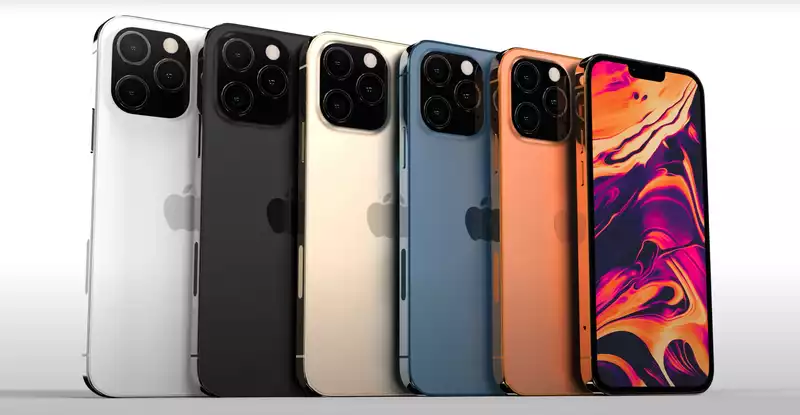The iPhone 13 would be a good idea to "borrow" from the best Samsung phones. This is because the past few generations of iPhones have been relatively similar in overall design and functionality. We've grown accustomed to OLED displays with massive Face ID notches and the ability of Apple smartphones to take impressive photos in all situations.
However, technology rarely stands still, and when comparing the specs and features of the latest Android phones to the iPhone 12, the latter looks a bit lacking. Even more so when you take into account models like the Samsung Galaxy S21 and the feature-packed Galaxy S21 Ultra.
Samsung was once seen as Apple's laggard in the smartphone world, but now it is blazing its own trail. And we think Apple can learn a thing or two from its rivals' latest models if it wants to make the iPhone 13 an attractive phone for everyone, not just Apple fans.
Indeed, the iPhone 13 should be unveiled at Apple's September 14 event. We have heard a lot about rumored features, so we will have to see if Apple has gotten some hints from Samsung for the new iPhone.
One of the best features of Samsung's Galaxy S21 series is arguably the 120Hz OLED display. This means that the high refresh display can be used without consuming battery power.
Apple has yet to move on from the 60Hz display, and while the iPhone 12's display is truly amazing and everything feels smooth thanks to the power of the A14 Bionic chip, there is no denying that the 60Hz panel feels dull.
But now that LTPO technology is readily available, Apple really should adopt it for the iPhone 13. Rumors suggest that the iPhone 13 Pro and iPhone 13 Pro Max will have 120Hz ProMotion displays, but the regular iPhone 13 and iPhone 13 mini will not.
Speaking of screens, there are rumors that the iPhone 13 may feature an always-on display. This is a feature that Android phones like the Galaxy S21 and OnePlus 9 Pro have, and Cupertino could catch up here.
The always-on display is useful for getting notifications and other information such as the current weather, time, and battery status without having to pick up the phone or unlock it. In addition, LTPO technology, which can reduce the refresh rate of the display, allows the iPhone 13 to have an always-on display without consuming a significant amount of battery power.
Samsung has put considerable effort into improving the ultrasonic fingerprint scanner in the Galaxy S21, making it faster and more reliable. Conversely, Apple has yet to adopt an under-display fingerprint scanner, relying instead on Face ID.
However, as robust as Face ID is, it breaks down when trying to detect users wearing masks, which have become more common thanks to the coronavirus pandemic. Therefore, while the pandemic is still raging, it would be useful to have alternative biometric security.
Some rumors claim that Apple is working on an under-display version of Touch ID for the iPhone 13, while others claim that the iPhone 14 will be the first with in-display Touch ID. It may appear a little later, as we expect COIVD-19 to have been relaxed by then.
However, Apple may also include Touch ID on the iPhone 13's power button, as it did with the iPad Air. This is something we have seen Samsung do to great effect with the Galaxy S10e.
Both the iPhone 12 Pro and iPhone 12 Pro Max have impressive telephoto cameras, the latter with 2.5x optical zoom and 5x effective range at best. In contrast, the Galaxy S21 offers 3x hybrid optical zoom and 30x digital zoom, and the Galaxy S21 Ultra can zoom up to 100x.
Extreme zooming can lead to rather muddy or distorted photos, but Samsung has done good things on the software side to make these more usable. the iPhone 12 Pro's camera cannot do the same.
This means that Apple has room to improve the iPhone 13 Pro's zooming. Perhaps Apple is looking for a supplier of a "folded-lens" camera that is said to improve optical zooming by providing a periscope-like arrangement for the lens. Even if Apple does not modify the telephoto camera hardware, some improvement in the size of the software could allow the iPhone 13 to offer better zooming capabilities than the previous model.
Apple has improved the charging speed of its recent iPhones, allowing the iPhone 12 to use a 20W charger. With such a charger, a depleted iPhone 12 Pro Max can charge about 50% of its 3,687 mAh battery in 30 minutes.
However, this is slower than the Galaxy S21's fast charging, which offers 25W fast charging via USB-C PD. Thus, the Galaxy S21's 4,000 mAh reaches 55% capacity in 30 minutes.
Apple's iPhone battery management is impressive in its own right, but we could learn from Samsung here and opt for faster charging on the iPhone 13. A larger battery would also be appreciated. There are rumors that Apple may jump to 25W charging in the iPhone 13, but not from a reliable source.
iPhone 13 rumors point to many other potential improvements, from a smaller notch and faster A15 Bionic chip to a larger battery and new camera features like portrait mode video. But if it can copy some of Samsung's better features in the process, Apple will have a real winner on its hands.
.









Comments